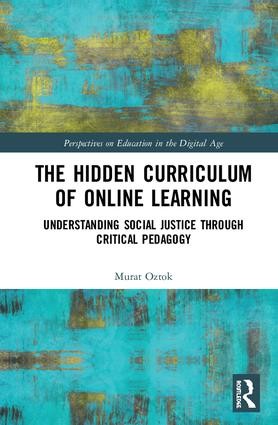
Senior Lecturer
- About
-
- Email Address
- murat.oztok@abdn.ac.uk
- School/Department
- School of Education
Biography
In a broader academic context, my research delves into the realm of digital education, situated at the confluence of curriculum studies, the sociology of knowledge, and critical pedagogy. I explore the rapidly expanding utilization of digital technologies in education, demanding a profound understanding of the challenges we confront. Thus, my research is concerned with comprehending the intricacies of teaching and learning within diverse digital-age contexts, grounded in both theoretical frameworks and a practical commitment to fostering equity, diversity, and inclusion. For instance, my recent book portrays online education as extension of colonial practices, wherein societal Discourses manifest and function, often engendering unjust learning conditions across various student cohorts. It underscores that unequal learning experiences are not random occurrences but rather mirror the existing societal disparities through the process of cultural reproduction.
Overall, my research challenges the a priori of digital education, which frequently extols its efficiency and productivity. Instead, my research agenda centres on the dynamic interplay among “self, knowledge, digital, and Discourses", all with the aim of fostering more equitable educational experiences and outcomes.

The Hidden Curriculum of Online Learning
A priori of online education is that online spaces offer equitable opportunities for people to openly and freely exchange ideas and engage in learning activities. I do not subscribe to this idea and portray online spaces where Discourses operate to produce disparate learning conditions among diverse student cohorts. This book offers a unique fusion of Michel Foucault's concept of Power with Postcolonial perspectives on Whiteness in the analysis of the social dynamics within online spaces.
- Research
-
Research Overview
Broadly speaking, there exists a significant gap in our understanding of the distinctive attributes of online postgraduate education. My overarching objective is to initiate an inquiry into the nature of being an online postgraduate student with a keen focus on decolonizing postgraduate education. In pursuit of this goal, I employ the framework of cognitive apprenticeship to illuminate the individual learning journeys of students engaged in online postgraduate programs.
Within the scope of my current research agenda, I aim to provide both theoretical insights and practical perspectives that contribute to fostering social justice in online postgraduate education. My contention is that the concept of cognitive apprenticeship, when situated within the context of decolonization, can offer a more nuanced framework for comprehending the unique characteristics inherent in online postgraduate provision. It is only then we can work towards more inclusive and equitable online postgraduate educational experiences.
Research Areas
Accepting PhDs
I am currently accepting PhDs in Education, Sociology, Psychology, Philosophy, Computing Science.
Please get in touch if you would like to discuss your research ideas further.

Education
Accepting PhDs
Sociology
Accepting PhDsPsychology
Accepting PhDs
Philosophy
Accepting PhDs
Computing Science
Accepting PhDsCurrent Research
- Unpacking the Colonial Legacy of Online Education: Further investigate and critically analyse the colonial underpinnings within online education, examining how digital technologies may perpetuate or challenge historical inequalities and power structures.
- Socio-Cultural Dimensions of Online Learning: Explore the socio-cultural aspects of online learning environments, emphasizing how societal Discourses influence digital education and contribute to differentiated learning experiences among diverse student populations.
- Equity and Inclusion in Digital Education: Develop and implement strategies, both theoretical and practical, to promote equity, diversity, and inclusion in digital education settings. Investigate how these strategies impact student outcomes and experiences.
- The Role of Critical Pedagogy: Extend the application of critical pedagogy principles within digital education contexts. Investigate how critical pedagogy can inform instructional design, teaching practices, and curriculum development for more equitable educational experiences.
- Innovative Pedagogical Approaches: Explore innovative pedagogical approaches that harness the potential of digital technologies to enhance equity and inclusivity in education. Investigate how emerging technologies, such as virtual reality or artificial intelligence, can be leveraged for educational equity.
- Intersectionality in Digital Learning: Investigate how multiple dimensions of identity, such as race, gender, socio-economic status, and disability, intersect in the context of digital education. Analyze how these intersections influence access, participation, and outcomes.
- Global Perspectives on Digital Education: Expand research beyond a single cultural context to explore international perspectives on digital education, considering how different sociocultural factors impact equity and inclusion.
- Publications
-
Page 1 of 1 Results 1 to 46 of 46
Postcolonial Entry Points into Networked Learning
Chapters in Books, Reports and Conference Proceedings: Conference Proceedings- [OPEN ACCESS] http://aura.abdn.ac.uk/bitstream/2164/24009/1/NL_SJ.docx
Postcolonial Entry Points into Networked Learning
Contributions to Journals: Conference ArticlesThe Role of Social Interactions and Cognition in Digital Spaces
Chapters in Books, Reports and Conference Proceedings: Conference Proceedings- [ONLINE] DOI: https://doi.org/10.22318/cscl2023.231933
- [ONLINE] View publication in Scopus
Cognitive Apprenticeship: A New Lens for Better Understanding Online Doctoral Provision
Chapters in Books, Reports and Conference Proceedings: Conference Proceedings- [ONLINE] https://repository.isls.org/handle/1/8949
- [ONLINE] DOI: https://doi.org/10.22318/icls2022.1437
- [ONLINE] View publication in Scopus
- [ONLINE] Link to conference page
Can we afford it?: The cybernetic determinants for pedagogical models in MOOCs
Chapters in Books, Reports and Conference Proceedings: Conference Proceedings- [ONLINE] DOI: https://doi.org/10.1109/ICALT49669.2020.00010
- [ONLINE] View publication in Scopus
To be or not to be: Social justice in networked learning
Education Sciences, vol. 9, no. 4, 261Contributions to Journals: Articles- [ONLINE] DOI: https://doi.org/10.3390/educsci9040261
- [ONLINE] View publication in Scopus
The hidden curriculum of online learning: Understanding social justice through critical pedagogy
Taylor and Francis Inc.. 116 pagesBooks and Reports: Books- [ONLINE] DOI: https://doi.org/10.4324/9780429284052
- [ONLINE] View publication in Scopus
New platform affordances for encouraging social interaction in MOOCS: The 'comment discovery tool' interactive visualisation plugin
Chapters in Books, Reports and Conference Proceedings: Conference Proceedings- [ONLINE] DOI: https://doi.org/10.1109/ICALT.2019.00014
- [ONLINE] View publication in Scopus
Social presence reconsidered: moving beyond, going back, or killing social presence
Social presence and identity in online learning. Routledge, pp. 259-266Chapters in Books, Reports and Conference Proceedings: ChaptersInteractive visualizations to enhance social learning practices in mooc platforms
Chapters in Books, Reports and Conference Proceedings: Conference Proceedings- [ONLINE] View publication in Scopus
Design based research approaches towards enhancing social learning practices in mooc platforms
Contributions to Journals: Conference Articles- [ONLINE] View publication in Scopus
Socialization and cognitive apprenticeship in online doctoral programs
Chapters in Books, Reports and Conference Proceedings: Conference ProceedingsSocialization and cognitive apprenticeship in online doctoral programs
Chapters in Books, Reports and Conference Proceedings: Conference Proceedings- [ONLINE] View publication in Scopus
Student Moderators in Asynchronous Online Discussion: Scaffolding Their Questions
Contributions to Conferences: PapersSocial presence reconsidered: moving beyond, going back, or killing social presence
Distance Education, vol. 38, no. 2, pp. 259-266Contributions to Journals: Articles- [ONLINE] DOI: https://doi.org/10.1080/01587919.2017.1322456
- [ONLINE] View publication in Scopus
The hidden curriculum of online learning: Discourses of whiteness, social absence, and inequity
Chapters in Books, Reports and Conference Proceedings: Conference Proceedings- [ONLINE] View publication in Scopus
Designing computer-supported complex systems curricula for the next generation science standards in high school science classrooms
Systems, vol. 4, no. 4, 38Contributions to Journals: Articles- [ONLINE] DOI: https://doi.org/10.3390/systems4040038
- [ONLINE] View publication in Scopus
Being social or social learning: A sociocultural analysis of the futurelearn mooc platform
Chapters in Books, Reports and Conference Proceedings: Conference Proceedings- [ONLINE] DOI: https://doi.org/10.1109/ICALT.2016.28
- [ONLINE] View publication in Scopus
No one ever steps in the same discussion twice: The relationship between identities and meaning
Chapters in Books, Reports and Conference Proceedings: Conference Proceedings- [ONLINE] View publication in Scopus
Cultural ways of constructing knowledge: the role of identities in online group discussions
International Journal of Computer-Supported Collaborative Learning, vol. 11, no. 2, pp. 157-186Contributions to Journals: Articles- [ONLINE] DOI: https://doi.org/10.1007/s11412-016-9233-7
- [ONLINE] View publication in Scopus
Social presence and impression management: understanding networked learners’ cultivation of learning networks
Chapters in Books, Reports and Conference Proceedings: Conference ProceedingsSocialization and social capital in online doctoral programs
Chapters in Books, Reports and Conference Proceedings: Conference ProceedingsStudent understanding of scientific practices and crosscutting themes via an NGSS–targeted curriculum and instruction project
Contributions to Conferences: Oral PresentationsReconceptualizing the pedagogical value of student facilitation
Interactive Learning Environments, vol. 24, no. 1, pp. 85-95Contributions to Journals: Articles- [ONLINE] DOI: https://doi.org/10.1080/10494820.2013.817440
- [ONLINE] View publication in Scopus
Designing curriculum and instruction for computer-supported complex systems teaching and learning in high school science classrooms
J-STEM : Journal of Research in STEM Education, vol. 1, no. 1, pp. 1-14Contributions to Journals: ArticlesCapitalizing on social presence: The relationship between social capital and social presence
Internet and Higher Education, vol. 26, pp. 19-24Contributions to Journals: Articles- [ONLINE] DOI: https://doi.org/10.1016/j.iheduc.2015.04.002
- [ONLINE] View publication in Scopus
Design features for computer-supported complex systems learning and teaching in high school science classrooms
Chapters in Books, Reports and Conference Proceedings: Conference Proceedings- [ONLINE] View publication in Scopus
Impacts on student understanding of scientific practices and crosscutting themes through an NGSS–designed computer-supported curriculum and instruction project
Chapters in Books, Reports and Conference Proceedings: Conference Proceedings- [ONLINE] View publication in Scopus
Building curriculum and instruction for the next generation science standards:: articulating design features for computer-supported complex systems learning in science classrooms
Contributions to Conferences: Oral PresentationsDevelopment and initial validation of a social capital scale for online learning
Contributions to Conferences: Papers- [ONLINE] https://hdl.handle.net/1807/74925
Self-representation in online learning environments
Chapters in Books, Reports and Conference Proceedings: Conference Proceedings- [ONLINE] http://www.editlib.org/p/147865/
Introduction to the Special Issue on Graduate Student Innovations in Science, Mathematics, and Technology Education Research
Canadian Journal of Science, Mathematics and Technology Education, vol. 14, no. 2, pp. 109-119Contributions to Journals: Editorials- [ONLINE] DOI: https://doi.org/10.1080/14926156.2014.903322
- [ONLINE] View publication in Scopus
Examining the qualities of liked notes versus non-liked notes in a collaborative online learning environment
Chapters in Books, Reports and Conference Proceedings: Conference ProceedingsInequitable whiteness in online learning
Other Contributions: Other ContributionsPolysynchronous: Dialogic construction of time in online learning
E-Learning and Digital Media, vol. 11, no. 2, pp. 154-161Contributions to Journals: Articles- [ONLINE] DOI: https://doi.org/10.2304/elea.2014.11.2.154
- [ONLINE] View publication in Scopus
Towards understanding knowledge construction in online learning
Chapters in Books, Reports and Conference Proceedings: Conference Proceedings- [ONLINE] http://www.editlib.org/p/147764/
What social capital can tell us about social presence
British Journal of Educational Technology, vol. 44, no. 6, pp. E203-E206Contributions to Journals: Articles- [ONLINE] DOI: https://doi.org/10.1111/bjet.12079
- [ONLINE] View publication in Scopus
Tacit knowledge in online learning: Community, identity, and social capital
Technology, Pedagogy and Education, vol. 22, no. 1, pp. 21-36Contributions to Journals: Articles- [ONLINE] DOI: https://doi.org/10.1080/1475939X.2012.720414
- [ONLINE] View publication in Scopus
Exploring asynchronous and synchronous tool use in online courses
Computers and Education, vol. 60, no. 1, pp. 87-94Contributions to Journals: Articles- [ONLINE] DOI: https://doi.org/10.1016/j.compedu.2012.08.007
- [ONLINE] View publication in Scopus
The role of identities in the process of knowledge construction in CSCL settings
Contributions to Journals: Conference Articles- [ONLINE] View publication in Scopus
Interaction in an asynchronous online course: A synthesis of quantitative predictors
Journal of Asynchronous Learning Network, vol. 16, no. 4, pp. 71-82Contributions to Journals: Articles- [ONLINE] DOI: https://doi.org/10.24059/olj.v16i4.265
- [ONLINE] View publication in Scopus
Synthesizing quantitative predictors for interaction in an asynchronous online course
Chapters in Books, Reports and Conference Proceedings: Conference Proceedings- [ONLINE] View publication in Scopus
The relationship between social presence and social capital in online learning communities
Chapters in Books, Reports and Conference Proceedings: Conference Proceedings- [ONLINE] http://editlib.org/p/39437
Towards better understanding of self-representation in online learning
Chapters in Books, Reports and Conference Proceedings: Conference Proceedings- [ONLINE] http://www.editlib.org/p/41879/
Social presence and online learning: a review of research
Journal of Distance Education, vol. 25, no. 3Contributions to Journals: ArticlesICT sufficiency in cooperative projects via the Internet
WSEAS Transactions on Computer Research, vol. 3, no. 1, pp. 51-60Contributions to Journals: Articles- [ONLINE] View publication in Scopus
